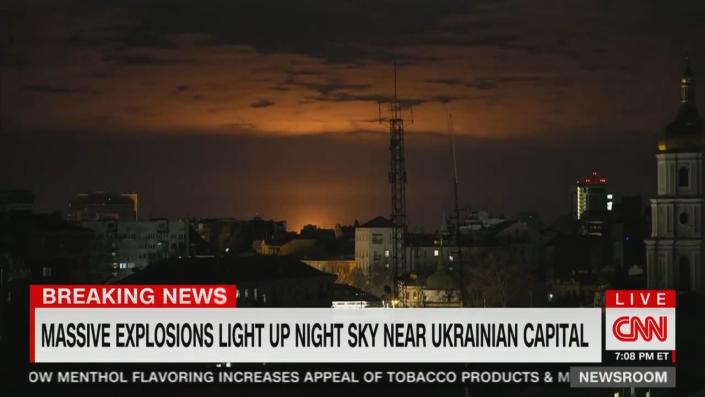Russia began a massive assault on Kyiv around midnight local time on Saturday, as Ukrainian forces to retain control of the capital on the third day of Vladimir Putin’s unprovoked invasion.
The latest: Ukrainian authorities confirmed that Russian missile strikes hit an oil depot south of Kyiv, causing a massive fire and lighting up the sky in a pulsating orange hue.
Get market news worthy of your time with Axios Markets. Subscribe for free.
-
Ukraine also confirmed that Russian forces blew up a gas pipeline in Kharkiv, a city on the Russian border in northeast Ukraine that has endured some of the most intense fighting of the war.
-
Warning that Russia would continue to cause “man-made disasters” by assaulting chemical plants and critical infrastructure, authorities posted instructions for civilians to close their windows and take other safety precautions.
-
Ukrainian President Volodymr Zelensky released a defiant video message as curfew was setting, declaring “we will fight as long as it takes to liberate the country. “
What’s happening: Russia’s defense ministry said that all units were ordered to resume their offensive from all directions after a “pause” on Friday for possible negotiations with Ukraine, according to state media.
-
A senior U.S. defense official told reporters Putin has “more than 50% of his total assembled power now committed inside Ukraine,” and that “tens of thousands” of troops have entered in the country in the last 24 hours.
-
The official added that there are indications Russia did not anticipate this level of Ukrainian resistance and has had to commit more logistics and supplies, such as fuel, than initially planned.
-
Russia has restricted Twitter and Facebook within the country, as state media continues to feed viewers the false narrative that the invasion is a limited military operation to stop a “genocide” in eastern Ukraine.


Screenshot via CNN
Zoom out: The European Union, U.S. and other Western allies reached an agreement on Saturday to disconnect select Russian banks from the SWIFT international payments system and impose restrictions on Russia’s Central Bank.
-
The extreme sanctions were unthinkable for many European officials as recently as last week and are likely to cripple the Russian economy.
-
Germany also announced it would send 1,000 anti-tank weapons and 500 Stinger missiles to Ukraine — a major reversal of its strict arms export policies that came after weeks of public pressure.
-
The White House has asked Congress to authorize $6.4 billion in emergency assistance for Ukraine, which will be divided between humanitarian and military aid.
-
Estonia, Lithuania, Romania and Latvia said Saturday they would ban Russian airlines from their airspace. The move followed similar announcements from Poland, the United Kingdom, Moldova and the Czech Republic.


“We will paralyse the assets of Russia’s central bank,” said EU Commission President Ursula von der Leyen on Saturday. “This will freeze its transactions. And it will make it impossible for the Central Bank to liquidate its assets.” Photo: Dursun Aydemir/Anadolu Agency via Getty Images
What to watch: The United Nations Security Council will vote on Sunday on whether to convene a special session of the UN General Assembly to debate Russia’s invasion of Ukraine.
-
The procedural vote, which only requires a nine-member majority to pass, is expected to advance since Russia can’t exercise its veto power.
By the numbers: The UN has confirmed at least 240 civilian casualties since the invasion began, but believes the “real figures are considerably higher.”
-
More than 150,000 refugees have fled Ukraine into neighboring countries since Russia launched its invasion.
-
At least 100,000 refugees are displaced internally in Ukraine and “the numbers are most likely much higher,” head of global communications for the UN refugee agency Joung-ah Ghedini-Williams said on Saturday.
Between the lines: Zelensky has emerged as a resolute and unifying wartime leader for his country during the first days of the Russian invasion, calmly delivering patriotic speeches from his phone on the darkened streets of Kyiv.
Go deeper: The latest on the Russia-Ukraine crisis
Editor’s note: This article has been updated throughout.
Like this article? Get more from Axios and subscribe to Axios Markets for free.




